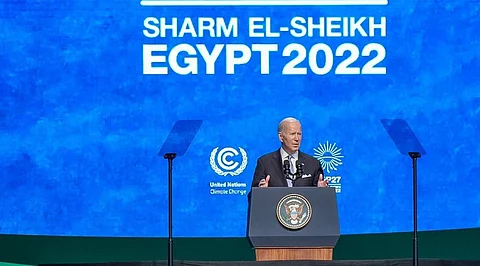

The developed countries, mainly the European Union and the United States, do not seem to be very keen on an outcome on a loss and damage facility at the 27th Conference of Parties (COP27) to the United Nations Framework Convention on Climate Change (UNFCCC) in Sharm El-Sheikh.
They appear to be pushing for private finance outside the UNFCCC process. The prevailing sense from the governing body of the European continent seems to be focusing on resolving domestic energy security in the context of the war in Ukraine.
At a press conference on November 15, 2022, Frans Timmermans, the executive vice president of the European Commission, which represents and negotiates on the behalf of the EU said:
We are open to move forward on loss and damage discussions but I don’t want a decision this week that has a lid screwed on that makes moving forward much more difficult.
He added: “We want to build bridges. The EU has shown openness. I don’t see a decision on loss and damage finance happening today (November 15). I don’t know what will happen in the rest of the week and which form would the facility take.”
Timmermans also informed that the EU member countries want to make sure that money reaches a disaster-struck country immediately after a disaster. Mobilising finance is important for this to happen.
He highlighted that the Global Shield Against Climate Risks launched by the V20 and G7 group of countries November 14 was also an option for financing loss and damage.
The initiative was launched specifically for providing pre-arranged finance quickly to a country that has recently faced an extreme weather disaster. “Moving forward, we have to look at all the options for financing loss and damage,” Timmermans said.
He also stressed on tailor-made solutions in accordance with the challenges faced by individual countries and that this needs to be discussed this week and beyond.
Many parties and the COP presidency seem to be hinting at private financing being the only possible solution to address the needs of countries on adaptation and loss and damage.
Many European countries and the United States have announced financial pledges for both adaptation and loss and damage. But these are minuscule amounts that won’t be able address the needs of vulnerable developing and least developed countries that run into billions.
On November 15, seven countries pledged new funds for the Least Developed Countries Fund (LDCF) and Special Climate Change Fund (SCCF).
A total of $105.6 million was announced by Denmark, Finland, Germany, Ireland, Slovenia, Sweden, Switzerland, and the Walloon Region of Belgium. Many other countries expressed political support and willingness to contribute in the coming months.
Another example is the $150 million for accelerating adaptation action in Africa announced by President Joe Biden a few days back.
“The announcement of $150 million for the whole of Africa was a mere downpayment from President Biden. Now the money will flow in from other sources,” US special envoy on climate, John Kerry had said at a press briefing November 12.
“The private sector has the money and can invest in projects but they need returns on their investments. Money will flow in from private sources if we engage in de-risking in vulnerable countries,” he added.
What developed countries seem to be suggesting is that this initial or seed funding would reduce risks in of investment in these countries and subsequently bring in private money. But the private sector does not have much of an idea even about what adaptation actually means.
At a side event on shaping the way forward for adaptation Feike Sijbesma, the co-chair of the Global Center on Adaptation, pointed out something that would be crucial in the discussions of including private finance for adaptation funding.
He said in the many conversations he has had with private companies about adaptation finance he has found that their understanding of adaptation is limited. They often ask the difference between mitigation and adaptation.
Due to this, businesses often are not able to connect with funds and alternatively, funds are not able to connect with businesses.
At another COP27 side event held November 10, Francine Baron, former finance minister of Dominica and currently the chief executive officer of the Climate Resilience Execution Agency for Dominica (CREAD) said:
“Addressing loss and damage requires funding. One has to find sources of finance. What is available is not grant funding or concessional finance. Therefore, there is debt burden as money has to be given to communities and loans taken.
“It is very difficult for a vulnerable country to be able to get the loans. It takes four to five years to get the process and begin spending. We have to look at mechanisms to be able to get financing that is affordable accessible at a very short notice.”
Though initiatives like the Global Shield could solve the problem of immediacy they may be too expensive for most of the vulnerable countries and may increase their debt burden.
“Insurance premiums are very high. Any government can’t do that in the short term. Whatever funding is decided upon should be easy to access and the process shouldn’t be too complicated.
“Usually, financial institutions are difficult to deal with. Therefore, countries with historic responsibility have to pay for the damages that are occurring. I hope the negotiations consider all these issues while deciding upon,” said Baron.
One of the reasons that Timmermans cited for Europe not making an extra effort regarding climate action was the ongoing war in Ukraine.
If Europeans don’t help their households and businesses with providing energy there will be strife among populations, they will become weak and it would be difficult to face (Russian President Vladimir) Putin, according to Timmermans.